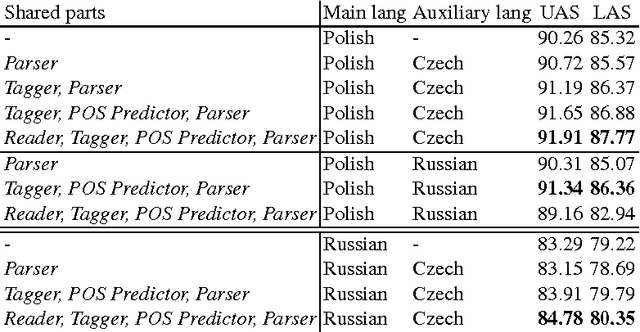Michał Zapotoczny
Read, Tag, and Parse All at Once, or Fully-neural Dependency Parsing
Jun 05, 2017



Abstract:We present a dependency parser implemented as a single deep neural network that reads orthographic representations of words and directly generates dependencies and their labels. Unlike typical approaches to parsing, the model doesn't require part-of-speech (POS) tagging of the sentences. With proper regularization and additional supervision achieved with multitask learning we reach state-of-the-art performance on Slavic languages from the Universal Dependencies treebank: with no linguistic features other than characters, our parser is as accurate as a transition- based system trained on perfect POS tags.
On Multilingual Training of Neural Dependency Parsers
May 29, 2017



Abstract:We show that a recently proposed neural dependency parser can be improved by joint training on multiple languages from the same family. The parser is implemented as a deep neural network whose only input is orthographic representations of words. In order to successfully parse, the network has to discover how linguistically relevant concepts can be inferred from word spellings. We analyze the representations of characters and words that are learned by the network to establish which properties of languages were accounted for. In particular we show that the parser has approximately learned to associate Latin characters with their Cyrillic counterparts and that it can group Polish and Russian words that have a similar grammatical function. Finally, we evaluate the parser on selected languages from the Universal Dependencies dataset and show that it is competitive with other recently proposed state-of-the art methods, while having a simple structure.
 Add to Chrome
Add to Chrome Add to Firefox
Add to Firefox Add to Edge
Add to Edge